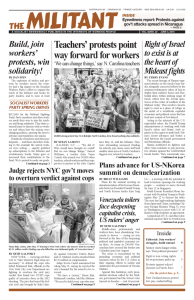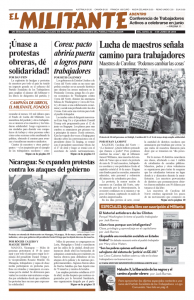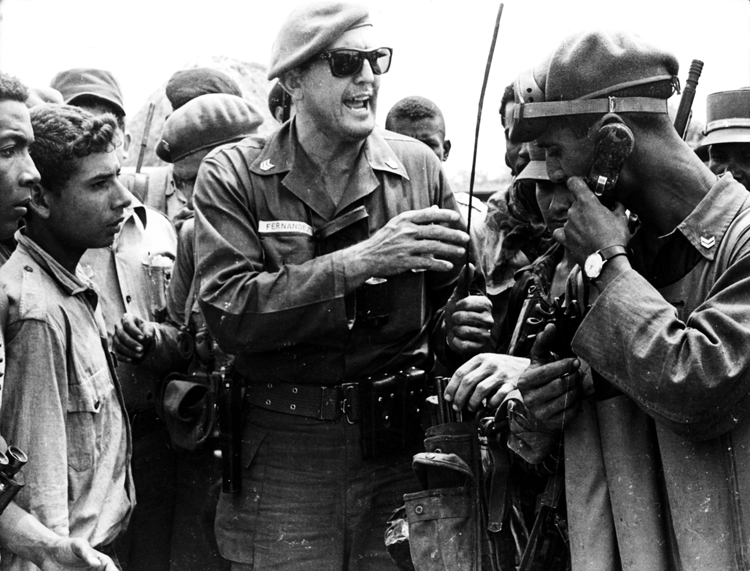Below is an excerpt from Making History: Interviews with Four Generals of Cuba’s Revolutionary Armed Forces, one of Pathfinder’s Books of the Month for May. “The Revolutionary Armed Forces are the people in uniform,” Cuban Brig. Gen. José Ramón Fernández said in a 1997 interview in Havana. Mary-Alice Waters, a leader of the SWP and president of Pathfinder Press, asked the questions. Fernández was the field commander at Playa Girón in 1961, where the popular militias and the Revolutionary Armed Forces defeated the U.S.-organized Bay of Pigs invasion force in just 72 hours. The book is a powerful introduction to the Cuban Revolution. Copyright © 1999 by Pathfinder Press. Reprinted by permission.
MARY-ALICE WATERS: Perhaps we could begin with how you became involved in the struggle against the Batista dictatorship before the revolution, and your responsibilities in building the new revolutionary army once the old regime had been destroyed.
JOSÉ RAMÓN FERNÁNDEZ: I was imprisoned for three years during the struggle against Batista. I had been part of a movement formed in early 1956 by young officers mainly from the military schools and the Havana garrison. We attempted to overthrow Batista and restore the bourgeois democracy that had existed here. Although the scope of the 1940 constitution of the Republic of Cuba was quite advanced, it was never enforced, as you know.
Batista’s March 10, 1952, military coup was prepared and organized by a group of active-duty army and navy officers neither whose ideas nor records augured anything good for the country in any way. …
On April 4, 1956, a military movement, which the people referred to as “los puros”—“the pure ones”— tried to topple Batista. It failed and a large number of those involved were sent to prison; others went into exile, retired, left the army, or were transferred to distant commands. …
When the revolution triumphed, I joined the Rebel Army as a first lieutenant, the same rank I held previously. Since I was a trained professional (and I say this with no vanity), I was given the task of helping to train the Rebel Army — more than to train it actually, to help transform the Rebel Army and the Revolutionary Armed Forces in general. …
WATERS: It would be useful to return to a point you made earlier about the difference between a bourgeois army and a revolutionary army — the difference in the treatment of soldiers, and the relations between soldiers and officers.
FERNÁNDEZ: As a rule, a bourgeois army imposes its command, with some variation, through law, through established norms based exclusively on hierarchy and rank. A socialist army, our army, also uses norms and requires obedience. But discipline is achieved through conscious methods, and the commanding officers derive their authority from the consent of their subordinates; they earn that authority every day by their ability, work, and example.
In this army nobody can give orders who is not respected, who does not have the approval of one’s subordinates. Command, clearly, isn’t conferred by elections, but it’s essential to have the consent and approval of one’s subordinates. The army requires very strict discipline; there can be no concessions on that. But it must be very just, very humane, and maintain the highest moral values.
There have been tremendous abuses in other armies we know, or have known. To me, the attitudes that exist in the U.S. Marine Corps and among its instructors are often bestial; they’re often criminal, inhumane, and unworthy. They are truly contemptible in a military institution. I’m not talking about the young people who have drowned in the swamps. I’m talking about the dehumanizing and denigrating methods of treating young people. That is unacceptable. That is an example of the difference between the two types of armies.
When someone who exercises authority or enforces discipline must do so, this often rankles those who are the objects of the command. You have to remember, however, that in our armed forces there are the units of the party; there are units of the UJC [Union of Young Communists]. These organizations strive for discipline and at the same time defend and guarantee the rights of individuals. There are places where one may speak frankly and say everything, regardless of rank. That doesn’t happen in other armies. …
We are sometimes accused of violating human rights. As our foreign minister has pointed out, this is part of a selective campaign carried out by our adversaries to create hostility against Cuba and undermine our prestige. As far as I am concerned, the first human right is the right to live, to receive an education, to live with dignity, to have the possibility of always receiving health care, to a job, to hold a place in society based on one’s capacities, technical training, talent, and desires. And to have a right to a country that exists with dignity, as a sovereign nation.
Not a single prisoner has been tortured here in Cuba; not a single person has disappeared — not one, in thirty-eight years. Who among those who accuse us of human rights violations, or who act as accomplices by voting to condemn us, could raise their hand and say the same thing? We do not permit anyone to be mistreated for reasons of sex, religion, or the color of one’s skin. I’d like to know how the human rights of Hispanic immigrants or Blacks are observed in the United States. Look at California, Florida, New York. Could they say what I have just said? They can exert pressure and muster votes to condemn us, but they are following a selective policy toward us, and we do not feel guilty.
Few places guarantee human rights as Cuba does — not just in word but in deed. Very few — if anyone — among those who condemn us on the basis of human rights has any moral standing whatsoever to do so. That’s a point I wanted to be sure to make, since we have spoken of struggle, of ethics, and of morality.
We are poor, but we have dignity. We are not ashamed of our poverty. We would be ashamed to be rich as a result of theft, of exploitation, of corruption. We would be ashamed to become rich that way.


